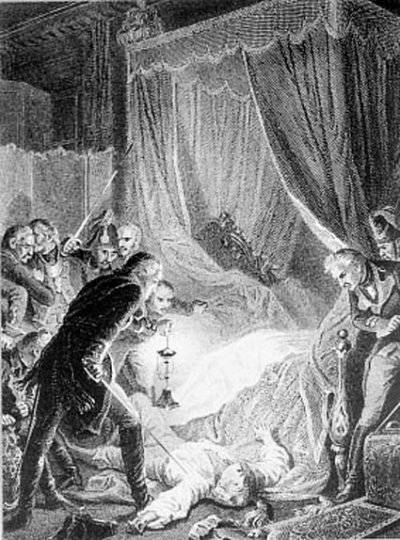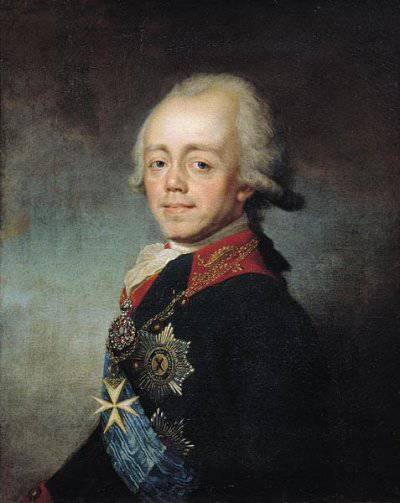Paul I - the tragedy of Hamlet in Gatchina
 Russian emperor Pavel I was brutally strangled and beaten with drunken officers in his own bedroom at night (11) 23 in March 1801, in the Mikhailovsky Castle.
Russian emperor Pavel I was brutally strangled and beaten with drunken officers in his own bedroom at night (11) 23 in March 1801, in the Mikhailovsky Castle. The life and death of the Russian Hamlet - that is the name of Emperor Paul I - is still shrouded in mystery to this day. Around the monarch, who fell victim to the last stories Russian palace coup, goes a lot of rumors. Modern researchers express the most diverse points of view on the activities of this ambiguous personality. Some consider him a half-crazy pedant, a fanatic of drill and uniform discipline, others compare Paul to Peter the Great.
The future emperor was born in the summer palace of Elizabeth Petrovna, and immediately after her birth, she was isolated from her mother and father. The impressionable and vulnerable boy from childhood was deprived of maternal love, but treated kindly by the royal grandmother. The reckless life of Catherine II after accession to the throne, coupled with a ten-year barren marriage, gave rise to many rumors and legends about the genetic father of Paul I. Doubts about the origin of the heirs to the Russian throne existed during the reign of all empresses, because of their unrestrained lifestyle and favor to court men.
Since childhood, the best teachers were assigned to Paul, the training program was carefully coordinated, and the education of the emperor was considered one of the best. Thanks to the spiritual emphasis of the teachers, Paul profoundly believed in God and did not change his convictions throughout his life. Broad knowledge in the military sphere allowed him to begin the reform of the army. Even Alexander, described as an opponent of the policy of the Gatchina monarch, did not reverse the transformation in this area, but continued. If you impartially analyze the state activity of Paul I, you can see that all his efforts were aimed at reducing the influence of the nobility. After the death of Catherine II, with whom the heir had a very strained relationship, state policy has changed dramatically. Paul always condemned the way of life of his powerful mother, and her activity, therefore, having become emperor, he tried to radically change the order in the country. It was believed that Paul sought to destroy any reminders of her, but more and more researchers express doubts about this assessment. The scrupulousness, pettiness and severity turned out to be a strong irritant for the court environment favored by Catherine.
The reform of the army angered representatives of the nobility, although it was an objective necessity. The fact is that at the time of the accession of Paul I to the throne, the Russian army was experiencing another crisis. Most of the nobles was listed in the army, but in fact did not bear service. Since the elite of society was appointed to officer positions, having neither practical nor, sometimes, theoretical skills and knowledge, the leadership of the military forces of the empire became mediocre. By the decrees of the emperor, this practice was stopped, the army began to reorganize according to the Prussian model.
Soviet historians and contemporaries of Paul I tried to make the emperor a fool or a lunatic. He is convicted of treacherous policy, but they forget that Prussia at the time of the reign of Paul I had the strongest army and was the best example of a military organization. In addition, the name of Frederick has not yet been forgotten, and his leadership talents were not disputed. Studying the biography of Paul and his works, we can conclude that the sovereign was not just an educated, but also a far-sighted politician. Kutuzov and other equally famous and talented individuals enjoyed special respect for the emperor, and educated and respected people were among the people in the circle of contacts. The emperor restricted the landowners ’right to serfdom, banning it on Sundays and establishing a border of three days a week, which caused the grumbling of landowners. The measure, in fact, was reasonable and aimed not only at establishing order, but also raising the general standard of living and the well-being of the serfs.
 Pavel I was an excellent family man, but, as usual, he had a favorite, Anna Gagarina, in whose honor one of the orders was called. The emperor's entourage constantly cultivated his suspicions about his wife, recalling the story of his parents. General irritation caused and excessive desire for order, regulation of all aspects of life, temper and austerity, bordering on cruelty. The emperor welcomed the punishments in the army and could personally disrupt epaulets from the guilty commanders, and also bring them to trial or send them to Siberia. He was hasty in decisions and easily fell into a rage. Sometimes the regulation of life was so exaggerated, and the sanctions for violations so high that the gossip about the insanity of the autocrat seemed plausible. Among the unpopular decisions of the emperor include the invitation of the Pope to Russia, as well as decrees on the form of clothing, hairstyles, daily routines and even crews. Due to the complex nature of the sovereign, the atmosphere in the society was tense, no one could rest easy for their future fate.
Pavel I was an excellent family man, but, as usual, he had a favorite, Anna Gagarina, in whose honor one of the orders was called. The emperor's entourage constantly cultivated his suspicions about his wife, recalling the story of his parents. General irritation caused and excessive desire for order, regulation of all aspects of life, temper and austerity, bordering on cruelty. The emperor welcomed the punishments in the army and could personally disrupt epaulets from the guilty commanders, and also bring them to trial or send them to Siberia. He was hasty in decisions and easily fell into a rage. Sometimes the regulation of life was so exaggerated, and the sanctions for violations so high that the gossip about the insanity of the autocrat seemed plausible. Among the unpopular decisions of the emperor include the invitation of the Pope to Russia, as well as decrees on the form of clothing, hairstyles, daily routines and even crews. Due to the complex nature of the sovereign, the atmosphere in the society was tense, no one could rest easy for their future fate.The death of the son of the great Catherine was sad - his own subjects were torn to pieces. It should be noted that Paul ascended the throne under circumstances that suggest that Catherine bequeathed the throne to her grandson Alexander, and not to her son. Paul I destroyed the archive of the mother, therefore, it is impossible to assert that the order about the succession to the throne was impossible. During his short reign, the emperor abolished the order of succession established by Peter Alekseevich. The transfer of power now occurred in the male line from father to eldest son, and in the absence of those to the eldest in the race. Women could now inherit the throne only by suppressing the male line. The epoch of palace coups, thus, was completed. Ironically, Paul was the victim of the last coup.
The emperor's close friend, Pyotr Palen, was in charge of organizing the conspirators; Nikita Panin also participated in it. On the eve of the conspiracy was discovered, and participation in it, Palen explained to the emperor as a deliberate action to prevent it and expose the criminals. It should be noted that the count was able to convince. On the eve of the cunning plan, Alexander swore again to his father, but the coup was nevertheless brought to life. Paul I did not hide from the Mikhailovsky Palace and hoped for salvation, even to the point of murder.
The ideas of the overthrow of Paul arose at the very first deprivations of the nobles of their privileges, already in the 1799 year. The Gatchina monarch did not take into account the propensity of the Russian court to change objectionable rulers. The follower of the policy of enlightened absolutism, Alexander, was most acceptable to the court entourage, so it was him who was inclined to conspiracy. According to the researchers, the number of supporters of the overthrow reached three hundred people by the time of the coup. The plan was to remove the sovereign from power, but not to kill him, but Count Palen understood perfectly well that it was inappropriate to keep Paul alive. Proponents of the inhabitants of Gatchina in the society nevertheless existed, and his existence would be a real threat to the reign of Alexander. Thus, the conspirators understood that the death of Paul I was inevitable, but hypocritically discussed the procedure for the arrest of his victim and his imprisonment.
According to some information, Alexander I himself asked Count Palen not to kill his father, moreover, understanding the absurdity of his request, the new emperor demanded not to cause him any physical suffering. As history has shown, Alexander’s demand was not fulfilled.
On the night of March 12 (old style), the loyal Palen Semenovsky Regiment headed for the Mikhailovsky Palace under the pretext of changing the Transfigurations. The explanation for the night replacement was found rather quickly. They relied on Paul’s almost paranoid desire for order and form. The conspirators notified the command of the Preobrazhensky regiment about the upcoming inspection scheduled for the morning. The occupation of the palace by the supporters of Palen did not arouse suspicion. Guard taken over without fanfare, for fear of attracting attention.
Shortly before a crowd of murderers broke into the emperor's chambers, Palen at a party poured champagne and drank him for Alexander's health. The Earl himself did not consume alcohol, and at the time of the massacre was completely clear with his mind. The owner of the drunken officers provoked aggression against the current emperor, presenting all the results of his activities in the most negative light. As a result, an angry and drunken mob broke into the castle, whose guards did not even think to resist and protect the autocrat. In a panic, the unfortunate did not think of anything better than to hide behind a curtain, but they quickly found him there.
There are two main versions of the murder of Paul. At one of them he was strangled with a scarf, at another the Count of Teeth struck the monarch with a mortal blow to the temple with a heavy snuffbox made of gold. Most likely both the one and the other took place, as the frantic officers, in their rage, mocked the helpless Paul. The unfortunate emperor was brutally beaten up, so it is difficult to understand now why he died. The autocrat's mutilated body was tried to be disguised, but it was a bad success. Abrasions and hemorrhages, especially the eye and temple of the monarch, were clear evidence of a crime.
The descriptions of the massacre differ, as the conspirators tried to justify themselves before their contemporaries for their act and deliberately distorted the facts.
In the ruins of a country estate in the vicinity of St. Petersburg they found a treasure. Among the things that experts date to the end of the 18 century, many English gold coins were discovered. The estate belonged to the sister of Count Platon Zubov, the last favorite of Catherine and one of the main participants in the conspiracy against Paul I. The discovery of British gold brings to mind one of the versions of the death of Emperor Paul I, who walked in the 19 century. Then they seriously assumed that the emperor fell not at the hands of people who wanted to rid Russia of a tyrant, but from assassins paid by the British crown.
Information